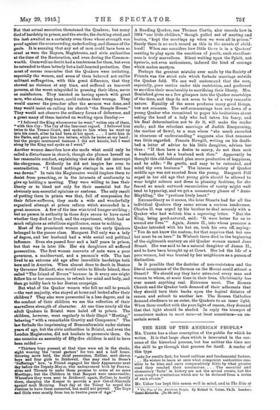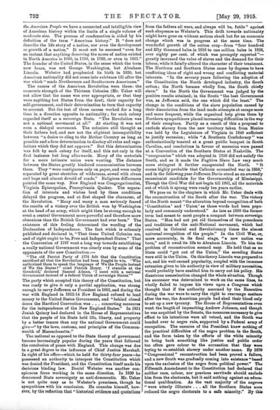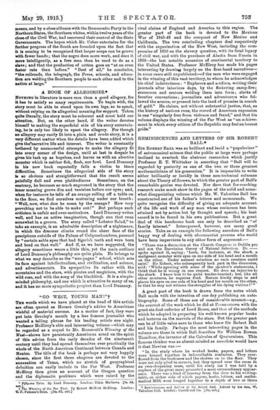THE RISE OF THE AMERICAN PEOPLE.* Me. Mines bas a
clear conception of the public for which be writes. It is that large class which is interested in the out- come of the historical process, but has neither the time nor the skill to go through that process for itself. A reader of this type
"asks for results first, for broad outlines and fundamental factors.
. He ',lithes to learn at once what competent authorities con- sider to be true, and cares comparatively little by what precise road they reached their conclusions. . . . The essential and elementary ' facts' in history are not the actual events, but the more complex conclusions which are to be deduced from a series of each events"
Mr. Usher has kept this canon well in mind, and in The Rise of • The Rise Ow Americas Peoria By Boland G. Using. l'b.D. London. Gnat Hsbseda Us. ed. oat.]
the American People we have a connected and intelligible view of American history within the limits of a single volume of moderate size. The process of condensation is aided by his definition of the term "American history." It "does not describe the life story of a nation, nor even the development or growth of a nation." It must not be assumed "even for an instant that anything deserving the name of nation existed in North America in 1660, in 1760, in 1789, or even in 1861." The founder of the United States, in the sense which the term now bears, was not George Washington, but Abraham Lincoln. Webster had prophesied its birth in 1830, but American nationality did not come into existence till after the war which " made Northerners and Southerners Americans."
The causes of the American Revolution were three the economic strength of the Thirteen Colonies (Mr. Usher will not allow that the name was ever appropriate, or that they were anything but States from the first), their capacity for self-government, and their determination to turn that capacity to account. But the last of these causes worked for a long time in a direction opposite to nationality ; for each colony regarded itself as a sovereign State. " The Revolution was not a national movement at all." At starting it was not even a disloyal movement. The colonists still thought as their fathers had, and saw not the slightest incompatibility between "a desire to cling to the Mother Country as long as possible and a firm determination to disobey all roles and regu- lations which they did not approve." But this determination was felt by each colony for itself, and this not only in the Seat instance but long afterwards. Many of the materials for a more intimate union were wanting. The distance between the States greatly hindered communication between them. They " were contiguous only on paper, and were really separated by great stretches of wilderness, sowed with rivers and bogs and almost devoid of roads." Religions differences pointed the same way. New England was Congregationalist, Virginia Episcopalian, Pennsylvania Quaker. The separa- tion of interests and wishes bred by these conditions delayed the progress, and at first shaped the character, of the Revolution. "Many and many a man seriously feared the results of a victory over the British won by Washington at the head of an army, which might then be strong enough to erect a central Government more powerful and therefore more obnoxious than the British Government had ever been." The existence of this feeling determined the wording of the Declaration of Independence. The fact which is solemnly published and declared is, "That these United Colonies are, and of right ought to be, Free and Independent States." That the Convention of 1787 went a long way towards establishing a really national Government was clearly seen by some of the opponents of the new Constitution
" The old Patriot Party of 1775 felt that the Constitution sacrificed all that the Revolution bad been fought to win. 'Who authorized them to speak the language of We the People instead of We the States ?' cried Patrick Henry. '1 stumble at the threshold,' declared Samuel Adams, 'I meet with a national Government instead of a federal Union of sovereign States!" The party which accepted this theory of the Constitution, but was ready to give it only a partial application, was strong enough to carry Jefferson as President in 1801, and during the war with England in 1812.14 New England refused to lend money to the United States Government, and "behind closed doors the Hartford Convention was . . . concerting measures for the independence of the New England States." In 1811 Josiah Quincy had declared in the House of Representatives that the people of his State held life, liberty, and property by a better tenure than any the national Government could give—" by the laws, customs, and principles of the Common- wealth of Massachusetts."
The national as opposed to the State theory of government became increasingly popular during the years that followed the conclusion of peace with England. This change was due in a great degree to the influence of Chief Justice Marshall. In right of his office—which he held for thirty-four years—he possessed an authority to interpret the Constitution which was denied the President, and the Constitution itself made his decision' binding law. Daniel Webster was another con- spicuous force working in the same direction. In 1830 he denounced State sovereignty as anti-demooratia Mr. Usher is not quite easy as to Webster's premium, though be sympathizes with his conclusion. He consoles himself, how- ever, by the reflection that " historical evidence and quotations from the fathers all were, and always will bee futile" against snoh eloquence as Webster's. This drift towards nationality might have gone on without serious check but for an economic change which was in progress at the same time. The wonderful growth of the cotton crop—from "four hundred and fifty thousand bales in 1816 to one million bales in 15e6, over eighty per cent. of which was promptly exported "- greatly increased the value of slaves and the demand for their labour, while it fatally altered the character of their treatment. The Northern and Southern States came by degrees to have conflicting ideas of right and wrong and conflicting material interests. "In the seventy years following the adoption of the Constitution the North developed industry, the South cotton ; the North became wholly free, the South chiefly slave." In the North the Government was judged by the positive results attained; in the South " the best Government was, as Jefferson said, the one which did the least." The change in the conditions of the slave population caused by their dissociation from the land made attempts at escape more and more frequent, while the organized help given them by Northern sympathizers placed increasing difficulties in the way of their recapture. Partly as a result of this a proposal to exclude slavery from the new territory taken from Mexico was held by the Legislature of Virginia in 1849 sufficient to justify secession; while "A Southern Confederacy" was enthusiastically toasted at a great public banquet in South Carolina, and resolutions in favour of secession were passed at a Convention of the Southern States at Nashville. The "compromise" which was adopted in 1850 did not satisfy the South, and as it made the Fugitive Slave Law very much more stringent it further exasperated the North. "It seems highly probable that Calhoun counselled war in 1850," and in the following year Jefferson Davis stood as an avowedly secessionist candidate for the Governorship of Mississippi. Though the Civil War did not begin till 1861, all the materials out of which it sprang were ready ten years earlier.
We pass on to the chapters in which Mr. Usher deals with the reconstruction of the South after the war. The victory of the North meant " the alteration beyond recognition of both ' Constitution' and ' Union' as those words had been popu- larly and commonly understood." As late as 1860 the former term had meant to most people a compact between sovereign States. "Men had not yet rid themselves of the precedents and traditions of the anti-National movement, which had received in Colonial and Revolutionary times the almost universal recognition of the people." In the Civil War, or, more accurately, in its final stage, "a new nation was born," and it owed its life to Abraham Lincoln. To him the problem of reconstruction seemed easy. He held that as no State could "get out of the Union," the seceding States were still in the Union. On this theory Lincoln was prepared to act, and his well-earned popularity, coupled with the immense extension given to his authority in view of military necessities, would probably have enabled him to carry out his policy. His disastrous assassination changed the whole situation. Though his successor was determined to work on the same lines, he wholly failed to impose his views upon a Congress which thought that if the authority assumed by the Executive during the war were to carry the right to rearrange matters after the war, the American people had shed their blood only to set up a new tyranny. The House of Representatives even went the length of impeaching Andrew Johnson, and though he was acquitted by the Senate, the measures necessary to give effect to his intentions were all vetoed, and the South was handed over to negro rule, supported by a Federal army of occupation. The enemies of the President knew nothing of the practical difficulties of the negro problem in the South, and the form taken by the efforts of the white minority to bring back something like justice and public order too often gave colour to the accusation that they were trying to re-establish slavery under another name. By 1870 "Congressional" reconstruction had been proved a failure, and anew South was gradually coming into existence "based upon the exclusion of the negro from political power." The Fifteenth Amendment to the Constitution had declared that neither race, colour, nor previous servitude should exclude him from the electorate, but it said nothing against an educa- tional qualification. As the vast majority of the negroes " were utterly illiterate . . all the Southern States soon reduced the negro electorate to a safe minority," By this means, and by a close alliance with the Democratic Party in the Northern States, the Southern whites, within twelve years of the aloes of the aril War, had recovered their control of the State Governments. The hopes which Mr. Usher entertains for the further progress of the South are founded upon the fact that it is coming to be recognized that larger crops can be grown with fewer hands ; that the negro does more work, and does it more intelligently, as a free man than he used to do as a slave; and that the production of cotton goes on " at an even faster rate than before." "Best of all," he concludes, "the railroads, the telegraph, the Press, schools, and educa- tion are welding the Southern people to each other and to the ration at large."




































 Previous page
Previous page